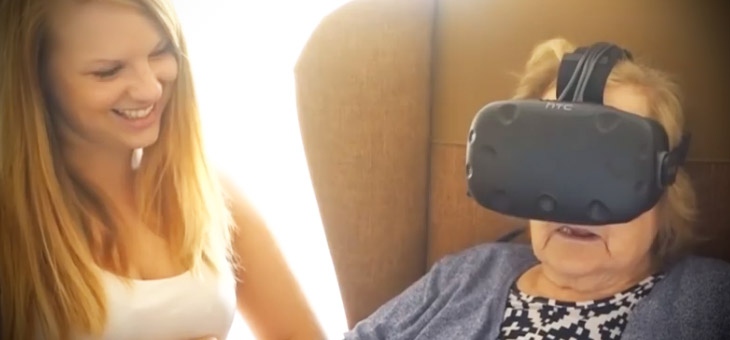Samsung is working with a number of residential care homes across NSW and the ACT to provide dementia patients with exciting new technology that aims to help them tick off their travel bucket lists.
With Samsung’s Gear Virtual Reality (VR) headsets, residents at Uniting aged care homes can participate in virtual reality and 360-degree video experiences that will help them to see the places that their conditions would otherwise prevent them from seeing.
“Residents at each home will be provided the opportunity to select an experience from their personal bucket list that they have yet to achieve, with particular emphasis on experiences they have longed for or did not think possible. Samsung will then source virtual reality content that responds to their request for them to enjoy,” said Samsung Australia’s Martin Brown.
Five Uniting aged care facilities are involved in the pilot, but the hope is that the program could run in aged care facilities around Australia.
“Using virtual reality technology in this way can give dementia residents and older Australians new adventures which they could not otherwise achieve due to mobility or health problems,” said Associate Professor Nick Brennan of the Waverley Uniting War Memorial Hospital in New South Wales.
“Studies suggest that virtual reality can have a therapeutic effect and stimulate the brain. Providing new adventures for these patients can help to reduce stress and boredom, and creates new ways for them to interact with their peers.”
Residents can visit an almost unlimited number of places. They can choose experiences such as orbiting earth from space, seeing the Grand Canyon, or walking through Canadian Redwood forests.
One resident, James Hadley, revisited his childhood home in Vancouver.
“You felt almost like you were in the whole situation. It makes you think. That was quite an experience that. It all went very quick,” said Mr Hadley.
The headsets will also be used to help train carers what it’s really like to live with dementia, through simulated experiences such as a woman being lost and disoriented in a strange street, or the confusion and frustration felt by patients when they start on a task but forget what they are doing halfway through.
It is hoped that VR technology will give carers a deeper understanding of the stress, confusion and disorientation of dementia patients, and allow carers to adapt and improve care programs and interaction with residents.
“Particularly for people who are working in aged care, and the families of people with dementia, you can put up a list – ‘these are the issues’. You can put up a slide and they go ‘yep, I get that’,” said Dementia Australia’s Dr Tanya Petrovich.
“But when you bring all these things together, and experience all those symptoms first hand … ticking them off a sheet is easy; to actually experience them is another thing. Understanding another person’s point of view is a lot easier when you’ve walked in their shoes.”
Have you tried VR? Do you imagine it could ever replace the true feeling of travel?
Related articles:
Can virtual reality treat dementia?
Eagle-eye view of Vienna
The future of cruising is virtual

